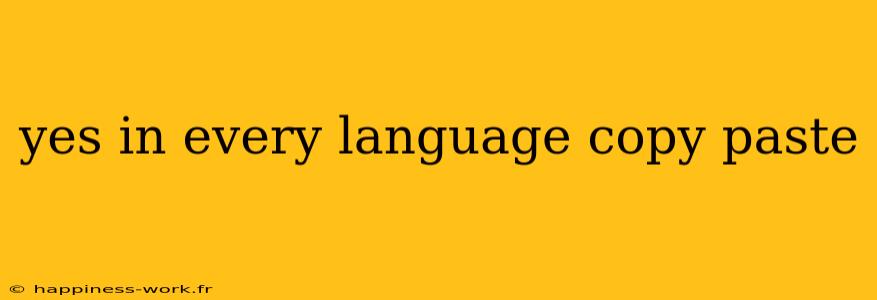Saying "Yes" Around the World: A Guide to Affirmative Greetings
Saying "yes" is a universal gesture of agreement, but how it's expressed can vary widely across languages and cultures. Let's explore the fascinating world of affirmative expressions, taking a look at how people say "yes" in various languages, and some interesting cultural nuances.
Common "Yes" Words Across the Globe:
- English: Yes
- Spanish: Sí
- French: Oui
- German: Ja
- Italian: Sì
- Russian: Да (Da)
- Chinese (Mandarin): 是 (shì)
- Japanese: はい (hai)
- Korean: 네 (ne)
- Arabic: نعم (na'am)
- Hindi: हाँ (haan)
- Portuguese: Sim
Beyond the Basics: Cultural Nuances
While these are some of the most common ways to say "yes," the nuances of affirmation go beyond simple translations. Here are some examples:
- Head Nodding: In many cultures, a simple nod of the head is understood as a "yes." However, in Bulgaria, a nod actually means "no," while shaking your head means "yes." This highlights the importance of understanding cultural context.
- Body Language: In some cultures, gestures like a smile or a raised eyebrow can convey agreement without spoken words. In Japan, for instance, a slight bow can be used to signify agreement, especially in formal settings.
- Contextual Considerations: Even within a single language, the appropriate response to a question may vary depending on the context. For example, in French, "oui" is the most common way to say "yes," but you might hear "tout à fait" (absolutely) or "bien sûr" (of course) in more formal situations.
Tips for Saying "Yes" Respectfully:
- Learn the basics: Familiarize yourself with common affirmative expressions in languages you might encounter.
- Observe local customs: Pay attention to how people express agreement through body language and gestures.
- Be aware of cultural differences: Research potential nuances in specific cultures to avoid misunderstandings.
- Show respect: Even if you don't speak the language fluently, a smile and a nod can go a long way in conveying agreement.
The Power of "Yes":
"Yes" is more than just a word. It's a powerful affirmation that opens doors to communication, collaboration, and understanding. By learning to say "yes" in different languages and cultures, we can build connections and strengthen our relationships around the world.
Sources:
- How to Say Yes in Other Languages - This article on WikiHow provides a comprehensive list of "yes" words in various languages.
- Cultural Differences in Communication: A Guide to Understanding Cultural Nuances - This article explores the different ways cultures communicate, including the role of body language and nonverbal cues.
